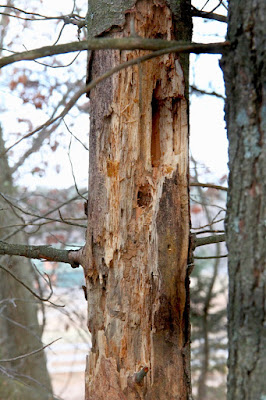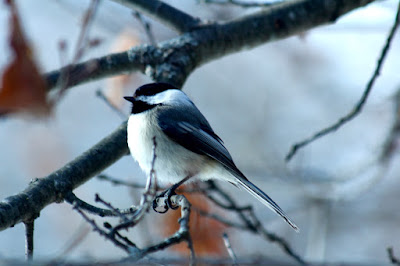- no blown down maple trees providing root hides for raccoons;
- no wind thrown oaks to shelter grouse from Winter storms and predators;
- no oak galls to feed grouse;
- no hollowed oaks to shelter wild bee honey combs;
- fewer chickadees for Winter cheery company;
- fewer grubs to feed pileated woodpeckers, and, thus, fewer holes for barred owls to shelter in or wood ducks to hatch eggs in
 |
| pileated woodpecker holes in pine tree
Photo by J. Harrington
|
Speaking strictly for myself, my world would be sadly diminished without ruffed grouse, honey, chickadees, woodpeckers and wood ducks, especially wood ducklings. On a good day I'll even concede that raccoons can have some redeeming characteristics, as long as they stay away from the trash cans. If my logic circuits are functioning properly, I think this means I need to join Aldo Leopold in appreciating that all may not be as it appears at first glance. This is as good a time as any to recall the folk tale about judging fortune versus misfortune.
chickadee on oak twig
Photo by J. Harrington
Who Knows? The Farmer's Son:
Fortune or Misfortune?
One day in late summer, an old farmer was working in his field with his old sick horse. The farmer felt compassion for the horse and desired to lift its burden. So he left his horse loose to go the mountains and live out the rest of its life.
Soon after, neighbors from the nearby village visited, offering their condolences and said, "What a shame. Now your only horse is gone. How unfortunate you are!. You must be very sad. How will you live, work the land, and prosper?" The farmer replied: "Who knows? We shall see".
Two days later the old horse came back now rejuvenated after meandering in the mountainsides while eating the wild grasses. He came back with twelve new younger and healthy horses which followed the old horse into the corral.
Word got out in the village of the old farmer's good fortune and it wasn't long before people stopped by to congratulate the farmer on his good luck. "How fortunate you are!" they exclaimed. You must be very happy!" Again, the farmer softly said, "Who knows? We shall see."
At daybreak on the next morning, the farmer's only son set off to attempt to train the new wild horses, but the farmer's son was thrown to the ground and broke his leg. One by one villagers arrived during the day to bemoan the farmer's latest misfortune. "Oh, what a tragedy! Your son won't be able to help you farm with a broken leg. You'll have to do all the work yourself, How will you survive? You must be very sad". they said. Calmly going about his usual business the farmer answered, "Who knows? We shall see"
Several days later a war broke out. The Emperor's men arrived in the village demanding that young men come with them to be conscripted into the Emperor's army. As it happened the farmer's son was deemed unfit because of his broken leg. "What very good fortune you have!!" the villagers exclaimed as their own young sons were marched away. "You must be very happy." "Who knows? We shall see!", replied the old farmer as he headed off to work his field alone.
As time went on the broken leg healed but the son was left with a slight limp. Again the neighbors came to pay their condolences. "Oh what bad luck. Too bad for you"! But the old farmer simply replied; "Who knows? We shall see."
As it turned out the other young village boys had died in the war and the old farmer and his son were the only able bodied men capable of working the village lands. The old farmer became wealthy and was very generous to the villagers. They said: "Oh how fortunate we are, you must be very happy", to which the old farmer replied, "Who knows? We shall see!"If I ever figure out how this might help us determine what we should be thankful for, I'll be sure to post it here, or, I might follow the perspective that "Those who know, don't say. Those who say, don't know." Which approach would you be most thankful for?
. . . It is the last survivor of a race
Strong in their forest-pride when I was young.
I can remember when, for miles around,
In place of those smooth meadows and corn-fields,
There stood ten thousand tall and stately trees,
Such as had braved the winds of March, the bolt
Sent by the summer lightning, and the snow
Heaping for weeks their boughs. Even in the depth
Of hot July the glades were cool; the grass,
Yellow and parched elsewhere, grew long and fresh,
Shading wild strawberries and violets,
Or the lark's nest; and overhead the dove
Had her lone dwelling, paying for her home
With melancholy songs; and scarce a beech
Was there without a honeysuckle linked
Around, with its red tendrils and pink flowers;
Or girdled by a brier-rose, whose buds
Yield fragrant harvest for the honey-bee
There dwelt the last red deer, those antler’d kings . . .
But this is as dream,—the plough has pass’d
Where the stag bounded, and the day has looked
On the green twilight of the forest-trees.
This oak has no companion! . . . .
********************************************
Thanks for visiting. Come again when you can.
Please be kind to each other while you can.

No comments:
Post a Comment